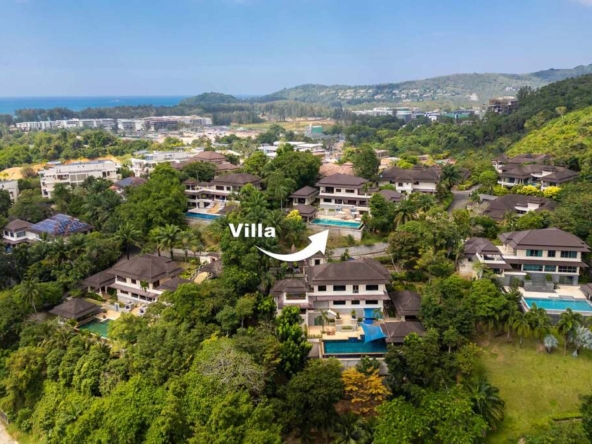Auther: Pakorn Promchoo (Fifa), Marketing Manager, CM Top Estate Co., Ltd.
Understanding the Legal Aspects of Purchasing Real Estate in Phuket as a Foreigner
Phuket, Thailand’s largest island, is a dream destination for many. With its pristine beaches, vibrant nightlife, and thriving expat community, it’s no wonder that many foreigners are drawn to the idea of owning property here. However, purchasing real estate in Phuket as a foreigner can be a bit complicated. To make a smart investment and avoid any potential issues, it’s important to understand the key legal aspects.
1. Foreign Ownership Restrictions
Firstly, it’s important to know that Thai law generally prohibits foreign ownership of land. This law is in place to ensure that land remains under the control of Thai nationals. However, this doesn’t mean that owning property in Phuket is impossible for foreigners. In fact, there are several legal ways to do so:
- Condominium Ownership: The easiest way for foreigners to own property in Thailand is by purchasing a condominium unit. Thai law allows foreigners to own up to 49% of the total area of all units in a condominium building. The remaining 51% must be owned by Thai nationals or Thai entities. The good news is that this ownership is freehold, meaning you have full ownership rights over the unit.
- Leasehold Agreements: Another popular method is through a leasehold agreement. Foreigners can lease land or property for up to 30 years, with the option to renew the lease for two additional periods of 30 years each. This essentially gives you a 90-year tenure. While this doesn’t provide full ownership, it’s a long-term solution for those looking to invest in Phuket real estate.
- Thai Company Ownership: Some foreigners choose to set up a Thai company to purchase land. In this case, the company owns the property, and the foreigner holds shares in the company. However, Thai law requires that the majority of the company’s shares (51%) must be owned by Thai nationals. This method is more complex and is subject to strict regulations to prevent misuse.

2. Due Diligence and Legal Considerations
Next, before purchasing any property in Phuket, conducting thorough due diligence is essential. This process involves several important steps:
- Title Search: It’s crucial to ensure that the property has a clear title deed. A title search will verify the ownership and confirm that the property is free from any encumbrances, such as mortgages or legal disputes.
- Land Zoning and Building Regulations: Phuket has specific zoning laws that govern land use and construction. Make sure to check whether the property complies with these regulations and whether there are any restrictions on its intended use.
- Contract Review: Any sale or lease agreement should be reviewed by a qualified lawyer. The contract should clearly outline all terms, including the payment schedule, transfer of ownership, and any obligations of both the buyer and seller.
- Legal Representation: It’s highly recommended to engage a local lawyer who specializes in real estate. They can assist with due diligence, contract negotiations, and ensure that all legal requirements are met during the transaction.
3. Financing the Purchase
Another point to consider is financing. Financing real estate purchases in Phuket can be challenging for foreigners because Thai banks typically do not offer mortgages to non-residents. However, some foreign banks and financial institutions do provide financing options for property purchases in Thailand. Additionally, some developers offer in-house financing, allowing buyers to pay in installments over a set period.

4. Taxes and Fees
When buying property in Phuket, there are several taxes and fees that you should be aware of:
- Transfer Fee: The transfer fee is typically 2% of the property’s appraised value and is paid to the Land Department at the time of transfer.
- Withholding Tax: If the seller is a company, a 1% withholding tax on the appraised value or the sale price (whichever is higher) is applicable. For individual sellers, a progressive withholding tax is calculated based on the number of years the property was owned.
- Stamp Duty and Specific Business Tax: Stamp duty is 0.5% of the registered sale value, while the specific business tax is 3.3% of the appraised value or the sale price, whichever is higher. Only one of these taxes is applicable, depending on the seller’s status and how long they have owned the property.
- Annual Property Tax: There is also a newly implemented land and building tax that applies annually. This tax is based on the property’s appraised value and its use (residential, commercial, etc.).
Conclusion
In conclusion, purchasing real estate in Phuket as a foreigner can be a rewarding investment, offering you a chance to own a piece of paradise. However, it requires careful navigation of Thailand’s legal framework. By understanding the ownership restrictions, conducting thorough due diligence, securing proper legal representation, and being aware of the associated taxes and fees, you can make a well-informed decision and ensure a smooth transaction.
Whether you choose to buy a condominium, enter into a leasehold agreement, or establish a Thai company, each option comes with its own legal considerations, making professional guidance essential. With the right approach, owning property in Phuket can be a fulfilling and profitable venture.
Related content on our website includes a guide for beginner investors. Read more https://cm-topestate.com/phukets-property-for-a-beginner-investor/
For further information, don’t hesitate to contact us. You can reach us via WhatsApp at +66 (0) 93-578-6028, send us an email at info.cmtopestate@gmail.com, or visit our website at www.cm-topestate.com. We are always available to assist you.



